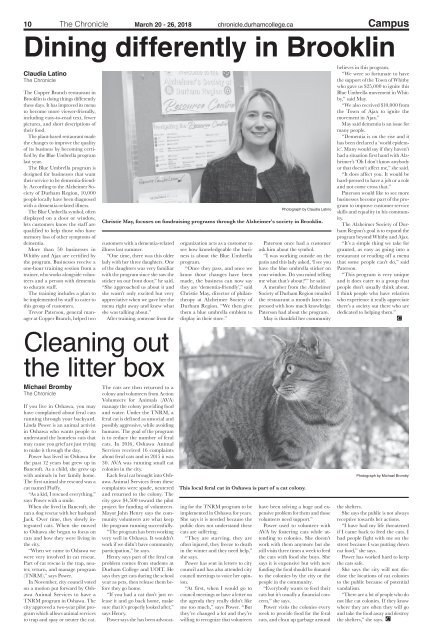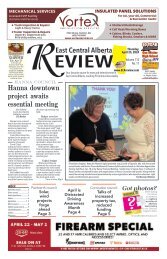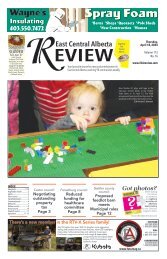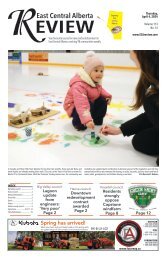You also want an ePaper? Increase the reach of your titles
YUMPU automatically turns print PDFs into web optimized ePapers that Google loves.
10 The <strong>Chronicle</strong> March 20 - 26, 2018 chronicle.durhamcollege.ca Campus<br />
Dining differently in Brooklin<br />
Claudia Latino<br />
The <strong>Chronicle</strong><br />
The Copper Branch restaurant in<br />
Brooklin is doing things differently<br />
these days. It has improved its menu<br />
to become more viewer-friendly,<br />
including easy-to-read text, fewer<br />
pictures, and short descriptions of<br />
their food.<br />
The plant-based restaurant made<br />
the changes to improve the quality<br />
of its business by becoming certified<br />
by the Blue Umbrella program<br />
last year.<br />
The Blue Umbrella program is<br />
designed for businesses that want<br />
their service to be dementia-friendly.<br />
According to the Alzheimer Society<br />
of Durham Region, 10,000<br />
people loc<strong>all</strong>y have been diagnosed<br />
with a dementia-related illness.<br />
The Blue Umbrella symbol, often<br />
displayed on a door or window,<br />
lets customers know the staff are<br />
qualified to help those who have<br />
memory loss of other symptoms of<br />
dementia.<br />
More than 50 businesses in<br />
Whitby and Ajax are certified by<br />
the program. Businesses receive a<br />
one-hour training session from a<br />
trainer, who works alongside volunteers<br />
and a person with dementia<br />
to educate staff.<br />
The training includes a plan to<br />
be implemented by staff to cater to<br />
this group of customers.<br />
Trevor Paterson, general manager<br />
at Copper Branch, helped two<br />
customers with a dementia-related<br />
illness last summer.<br />
“One time, there was this older<br />
lady with her three daughters. One<br />
of the daughters was very familiar<br />
with the program since she saw the<br />
sticker on our front door,” he said.<br />
“She approached us about it and<br />
she wasn’t only excited but very<br />
appreciative when we gave her the<br />
menu right away and knew what<br />
she was talking about.”<br />
After training, someone from the<br />
organization acts as a customer to<br />
see how knowledgeable the business<br />
is about the Blue Umbrella<br />
program.<br />
“Once they pass, and once we<br />
know those changes have been<br />
made, the business can now say<br />
they are ‘dementia-friendly’,” said<br />
Christie May, director of philanthropy<br />
at Alzheimer Society of<br />
Durham Region. “We then give<br />
them a blue umbrella emblem to<br />
display in their store.”<br />
Photograph by Claudia Latino<br />
Christie May, focuses on fundraising programs through the Alzheimer's society in Brooklin.<br />
Paterson once had a customer<br />
ask him about the symbol.<br />
“I was working outside on the<br />
patio and this lady asked, ‘I see you<br />
have the blue umbrella sticker on<br />
your window. Do you mind telling<br />
me what that’s about?’” he said.<br />
A member from the Alzheimer<br />
Society of Durham Region emailed<br />
the restaurant a month later impressed<br />
with how much knowledge<br />
Paterson had about the program.<br />
May is thankful her community<br />
believes in this program.<br />
“We were so fortunate to have<br />
the support of the Town of Whitby<br />
who gave us $25,000 to ignite this<br />
Blue Umbrella movement in Whitby,”<br />
said May.<br />
“We also received $10,000 from<br />
the Town of Ajax to ignite the<br />
movement in Ajax.”<br />
May said dementia is an issue for<br />
many people.<br />
“Dementia is on the rise and it<br />
has been declared a ‘world epidemic’.<br />
Many would say if they haven’t<br />
had a situation first hand with Alzheimer’s<br />
‘Oh I don’t know anybody<br />
or that doesn’t affect me,” she said.<br />
“It does affect you. It would be<br />
hard-pressed to have a job or a role<br />
and not come cross that.”<br />
Paterson would like to see more<br />
businesses become part of the program<br />
to improve customer service<br />
skills and equality in his community.<br />
The Alzheimer Society of Durham<br />
Region’s goal is to expand the<br />
program beyond Whitby and Ajax.<br />
“It’s a simple thing we take for<br />
granted, as easy as going into a<br />
restaurant or reading off a menu<br />
that some people can’t do,” said<br />
Paterson.<br />
“This program is very unique<br />
and it does cater to a group that<br />
people don’t usu<strong>all</strong>y think about.<br />
I think people who have relatives<br />
who experience it re<strong>all</strong>y appreciate<br />
there’s a society out there who are<br />
dedicated to helping them.”<br />
Cleaning out<br />
the litter box<br />
Michael Bromby<br />
The <strong>Chronicle</strong><br />
If you live in Oshawa, you may<br />
have complained about feral cats<br />
running through your backyard.<br />
Linda Power is an animal activist<br />
in Oshawa who wants people to<br />
understand the homeless cats that<br />
may cause you grief are just trying<br />
to make it through the day.<br />
Power has lived in Oshawa for<br />
the past 12 years but grew up in<br />
Bancroft. As a child, she grew up<br />
with animals in her family home.<br />
The first animal she rescued was a<br />
cat named Fluffy.<br />
“As a kid, I rescued everything,”<br />
says Power with a smile.<br />
When she lived in Bancroft, she<br />
ran a dog rescue with her husband<br />
Jack. Over time, they slowly integrated<br />
cats. When she moved<br />
to Oshawa she began to focus on<br />
cats and how they were living in<br />
the city.<br />
“When we came to Oshawa we<br />
were very involved in cat rescue.<br />
Part of cat rescue is the trap, neuter,<br />
return, and manage program<br />
(TNRM),” says Power.<br />
In November, city council voted<br />
on a motion put forward by Oshawa<br />
Animal Services to have a<br />
TNRM program in Oshawa. The<br />
city approved a two-year pilot program<br />
which <strong>all</strong>ows animal services<br />
to trap and spay or neuter the cat.<br />
This local feral cat in Oshawa is part of a cat colony.<br />
The cats are then returned to a<br />
colony and volunteers from Action<br />
Volunteers for Animals (AVA)<br />
manage the colony providing food<br />
and water. Under the TNRM, a<br />
feral cat is defined as unsocial and<br />
possibly aggressive, while avoiding<br />
humans. The goal of the program<br />
is to reduce the number of feral<br />
cats. In 2016, Oshawa Animal<br />
Services received 16 complaints<br />
about feral cats and in 2015 it was<br />
30. AVA was running sm<strong>all</strong> cat<br />
colonies in the city.<br />
Each feral cat brought into Oshawa<br />
Animal Services from these<br />
complaints were spade, neutered<br />
and returned to the colony. The<br />
city gave $4,500 toward the pilot<br />
project for funding of volunteers.<br />
Mayor John Henry says the community<br />
volunteers are what keep<br />
the program running successfully.<br />
“The program has been working<br />
very well in Oshawa. It wouldn’t<br />
work if we didn’t have community<br />
participation,” he says.<br />
Henry says part of the feral cat<br />
problem comes from students at<br />
Durham College and UOIT. He<br />
says they get cats during the school<br />
year as pets, then release them before<br />
they go home.<br />
“If you had a cat don’t just release<br />
it and go back home, make<br />
sure that it’s properly looked after,”<br />
says Henry.<br />
Power says she has been advocating<br />
for the TNRM program to be<br />
implemented in Oshawa for years.<br />
She says it is needed because the<br />
public does not understand these<br />
cats are suffering.<br />
“They are starving, they are<br />
often injured, they freeze to death<br />
in the winter and they need help,”<br />
she says.<br />
Power has sent in letters to city<br />
council and has also attended city<br />
council meetings to voice her opinion.<br />
“At first, when I would go to<br />
council meetings or have a letter on<br />
the agenda they re<strong>all</strong>y didn’t like<br />
me too much,” says Power. “But<br />
they’ve changed a lot and they’re<br />
willing to recognize that volunteers<br />
have been solving a huge and expensive<br />
problem for them and those<br />
volunteers need support.”<br />
Power used to volunteer with<br />
AVA by fostering cats while attending<br />
to colonies. She doesn’t<br />
work with them anymore but she<br />
still visits three times a week to feed<br />
the cats with food she buys. She<br />
says it is expensive but with new<br />
funding the food should be donated<br />
to the colonies by the city or the<br />
people in the community.<br />
“Everybody wants to feed their<br />
cats but it’s usu<strong>all</strong>y a financial concern,”<br />
she says.<br />
Power visits the colonies every<br />
week to provide food for the feral<br />
cats, and clean up garbage around<br />
Photograph by Michael Bromby<br />
the shelters.<br />
She says the public is not always<br />
receptive towards her actions.<br />
“I have had my life threatened<br />
if I came back to feed the cats. I<br />
had people fight with me on the<br />
street because I was putting down<br />
cat food,” she says.<br />
Power has worked hard to keep<br />
the cats safe.<br />
She says the city will not disclose<br />
the locations of cat colonies<br />
to the public because of potential<br />
vandalism.<br />
“There are a lot of people who do<br />
not like cat colonies. If they know<br />
where they are often they will go<br />
and take the food away and destroy<br />
the shelters,” she says.


















